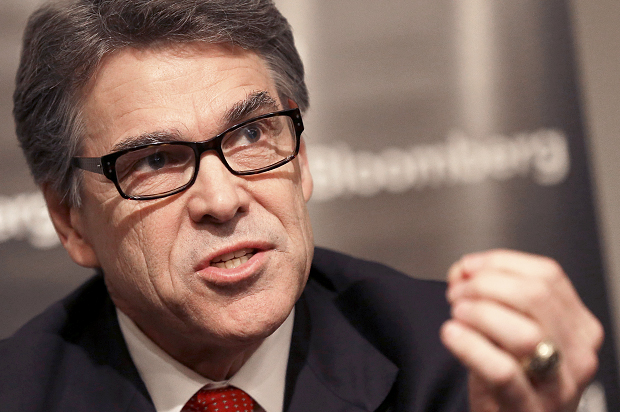Tomorrow will mark the one-year anniversary of Rick Perry’s most famous foray into immigration politics. Last July, as the country’s attention was fixed on the southern border and the thousands of unaccompanied Central American minors crossing into Texas from Mexico, then-governor Perry announced that he was sending up to 1,000 Texas National Guard troops to the border to help deal with the migrant crisis and to tamp down on drug cartel activity. “I will not stand idly by while our citizens are under assault and little children from Central America are detained in squalor,” Perry said at the time.
Almost immediately he got busy framing his decision as a bold and daring act by a resolute state executive who would do what needed to be done. “We no longer can wait for Washington to secure the border,” Perry told Fox News’ Sean Hannity two days after his announcement. “And Texas is going to do it with our law enforcement and with our National Guard.”
Since then, Perry has left the governor’s office and entered the 2016 presidential race, and the National Guard deployment factors heavily in his campaign messaging. When he talks about the troop surge at the border, he presents it as an unqualified success. “We’ve had a 74 percent decrease in the apprehensions along that southern region, that 150-mile region, which is where the bulk of the apprehensions occur,” he told Newsmax in April. Last week he got into a fight with Donald Trump over immigration and said “when I met with President Obama last year and it became clear he would not act, I told him if he would not secure the border, Texas would.”
So did Rick Perry “secure the border” with his deployment of National Guard troops? Yes and no… but mostly no.
Let’s start with the crisis that moved Perry to act in the first place: the wave of migrant children coming across the Texas border. As Perry loves to point out, apprehensions at the border plummeted after he announced the troop deployment. The Texas Department of Public Safety (DPS) released a report on Operation Strong Safety this past March that, at first glance, would appear to confirm Perry’s assertion. In the weeks following the start of Operation Strong Safety, the number of border apprehensions fell precipitously until about mid-August, at which point they leveled off and remained largely static for the next several months.
The question is how much of this decline can be attributed to Perry’s surge of National Guard troops. The answer: vanishingly little or none at all. The first of the troops that Perry ordered deployed didn’t arrive to the border until mid-August. So when they got there, the migrant crisis had already subsided. And even if they had gotten their earlier, it would be difficult to gauge what effect they would have had on apprehensions, since they were not authorized to apprehend people. There were a number of other factors that more directly contributed to the plunge in apprehensions, like stepped up efforts by the federal government to discourage migration from Central American countries, and Mexico’s crackdown on human trafficking and illegal crossings of its border with Guatemala.
Let’s move on to the other reason Perry offered for deploying those troops to the border: the need to combat drug cartels and various other criminal elements in the border area. First off, the narrative that the border areas are hotbeds of violence and criminal activity isn’t quite accurate. The Houston Chronicle reviewed crime data and found that when the surge of law enforcement officials was ordered, “the rate of serious crime in the Rio Grande Valley was at its lowest level in years. And in the 11 months since, the rate has not been significantly affected by the extra manpower.”
The question of Operation Strong Safety’s effectiveness at combating the cross-border drug trade has been muddled by the fact that DPS has been fudging some of the data it cites to demonstrate its impact. Earlier this year, DPS told lawmakers that about 150 tons of illegal drugs had been seized through Operation Strong Safety. It arrived at that number by including drug seizures made by the Border Patrol, which DPS described as an “equal partner” in the operation. But, as the Austin American-Statesman reported last month, the Border Patrol “didn’t see itself as part of Operation Strong Safety,” and sent a letter to Texas lawmakers clarifying that federal agencies “declined participation in the operation.” According to one estimate, “DPS contributed less than 10 percent to the latest surge’s drug interdiction efforts, with the rest of the drug seizures coming from other law enforcement agencies, including those funded by the federal government.”
If you want to be generous about Perry’s rhetoric surrounding the July 2014 National Guard deployment, you’d say that he’s overselling the impact those troops had. But really he’s taking credit for something he never did. Rick Perry did not secure the border as governor. Rather, he sent soldiers to fix a problem that was already largely fixed. And authorized an expensive law enforcement “surge” whose effectiveness has been questioned and difficult to determine given the obfuscations of the agency charged with implementing it. When Rick Perry says “Mr. President, if you don’t secure this border, Texas will,” it makes for a rousing talking point, but it isn’t true.

